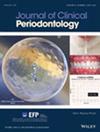长期禁食对代谢综合征患者口腔微生物群的影响:一项探索性的二次分析。
IF 5.8
1区 医学
Q1 DENTISTRY, ORAL SURGERY & MEDICINE
引用次数: 0
摘要
目的:评价长时间禁食对代谢综合征(MetS)患者口腔微生物群的影响。材料和方法本随访研究评估了42例met患者在长时间禁食期间口腔微生物组的变化。在基线(T1)、延长禁食5-10天(T2)和4-5个月随访(T3)时,测量牙周参数,如探诊出血(BOP)、菌斑指数(PI)和龈沟液(GCF),以及龈上和龈下菌斑样本。对16S rRNA基因V4高变区进行测序,分析微生物组组成。结果空腹后BOP由36.4%±18.2%降至30.4%±15.6% (p = 0.01), PI由66.9%±19.5%降至58.8%±23.4% (p < 0.01), GCF由83.6±27.8 PU降至67.9±30.3 PU (p < 0.01)。微生物组α-和β-多样性变化不显著。然而,特定细菌属发生了显著变化:毛螺科[G-3]仅在龈下样品中增加;Eikenella和Peptostreptococcaceae [XI][G-7]增加;而牙龈下和牙龈上的光氏菌和异托波菌均有所减少。结论:在本分析的约束下,发现长时间禁食与牙周炎症的减少和口腔微生物组成的选择性变化有关。需要更大规模的对照试验来证实这些探索性发现并确定其临床相关性。本文章由计算机程序翻译,如有差异,请以英文原文为准。
Impact of Prolonged Fasting on the Oral Microbiome in Patients With Metabolic Syndrome: An Exploratory Secondary Analysis.
AIM
To evaluate the effect of prolonged fasting on the oral microbiome in patients with metabolic syndrome (MetS).
MATERIALS AND METHODS
This follow-up study evaluated changes in the oral microbiome in a sub-cohort of 42 patients with MetS during prolonged fasting. Periodontal parameters such as bleeding on probing (BOP), plaque index (PI) and gingival crevicular fluid (GCF) measured in Periotron units (PU) as well as supra- and subgingival plaque samples were taken at baseline (T1), after 5-10 days of prolonged fasting (T2) and at 4-5-month follow-up (T3). Sequencing of the V4 hypervariable region of the 16S rRNA gene was performed to analyse the microbiome composition.
RESULTS
Significant reductions were observed in BOP: 36.4% ± 18.2% to 30.4% ± 15.6% (p = 0.01), PI: 66.9% ± 19.5% to 58.8% ± 23.4% (p < 0.01) and GCF: 83.6 ± 27.8 PU to 67.9 ± 30.3 PU (p < 0.01) post fasting. Microbiome α- and β-diversity did not change significantly. However, significant changes in specific bacterial genera were noted: Lachnospiraceae [G-3] increased only in subgingival samples; Eikenella and Peptostreptococcaceae [XI][G-7] increased; while Mitsuokella and Atopobium decreased in both sub- and supra-gingival samples.
CONCLUSION
Within the constraints of this analysis, prolonged fasting was found to be associated with reduced periodontal inflammation and selected shifts in the oral microbial composition. Larger controlled trials are needed to confirm these exploratory findings and determine their clinical relevance.
求助全文
通过发布文献求助,成功后即可免费获取论文全文。
去求助
来源期刊

Journal of Clinical Periodontology
医学-牙科与口腔外科
CiteScore
13.30
自引率
10.40%
发文量
175
审稿时长
3-8 weeks
期刊介绍:
Journal of Clinical Periodontology was founded by the British, Dutch, French, German, Scandinavian, and Swiss Societies of Periodontology.
The aim of the Journal of Clinical Periodontology is to provide the platform for exchange of scientific and clinical progress in the field of Periodontology and allied disciplines, and to do so at the highest possible level. The Journal also aims to facilitate the application of new scientific knowledge to the daily practice of the concerned disciplines and addresses both practicing clinicians and academics. The Journal is the official publication of the European Federation of Periodontology but wishes to retain its international scope.
The Journal publishes original contributions of high scientific merit in the fields of periodontology and implant dentistry. Its scope encompasses the physiology and pathology of the periodontium, the tissue integration of dental implants, the biology and the modulation of periodontal and alveolar bone healing and regeneration, diagnosis, epidemiology, prevention and therapy of periodontal disease, the clinical aspects of tooth replacement with dental implants, and the comprehensive rehabilitation of the periodontal patient. Review articles by experts on new developments in basic and applied periodontal science and associated dental disciplines, advances in periodontal or implant techniques and procedures, and case reports which illustrate important new information are also welcome.
 求助内容:
求助内容: 应助结果提醒方式:
应助结果提醒方式:


